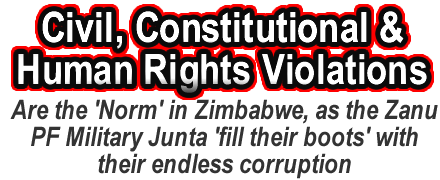- Details
- Written by: John C Burke
- Category: 45 years
- Hits: 531
Why do the World's Press, Governments and Academics, treat the Zanu PF Regime/administration in Zimbabwe as a Government?
UPDATE 18th APRIL 2025: Copy of our 45 years since Zimbabwe's Independence Petition as delivered to the PM and FCDO on the 18th April 2025 {CLICK HERE}
They are clearly and evidently a military mafia!
- For 45 years they have dominated all the citizenry with intimidation based on gencode (Gukurahundi), Abductions, Torture and the campaigns of RAPE - yet they are still treated as a government?
- In effect for 45 years the psychotic elite within Zanu PF have conducted a ruthless psychological campaign upon all Zimbabwean to remain in POWER - which appears to be their ONLY motivation - yet they are still treated as a government?
- The ruling (non-democratic - or nothing like a democracy) regime has robbed & stolen all & any Wealth out of Zimbabwe - for their personal enrichment - yet they are still treated as a government?
- The military mafia has deliberately and ruthlessly occupied/invaded/conquered every facet of the civic administration of Zimbabwe: the Military, The Police, the Electroral Commission, the Judiciary and more - yet they are still treated as a government?
- At the same time they have not lifted a finger to maintain or update the high quality Infrastructure of the Ian Smith Government left to them on the 18th April 1980. Roads, Bridges, Rail, Air Lines, Surface Drainage, Flood Controls, Water Supply, Power Supply and lastly Sewage system - all are now a mere shadow of what was left to them. Worse - they are now a danger to the general population, in terms of health and safety. Mortailty and Maternal Mortality numbers are of grave concern - yet they are still treated as a government?
Whilst the blame lies squarely with the selfish, violent, criminal, corrupt morons within Zanu PF - one cannot help to wonder WHY the rest of the WORLD TREATS THEM AS A GOVERNMENT?
 To illustrate this point let us shine a bright light upon the ZiG - something we said at launch that it was ANOTHER FRAUD! Yet Institutuion blindly took the Zanu PF clowns at their Word!
To illustrate this point let us shine a bright light upon the ZiG - something we said at launch that it was ANOTHER FRAUD! Yet Institutuion blindly took the Zanu PF clowns at their Word!
The long-term prognosis for Zimbabwe's ZiG currency, introduced in April 2024 as a gold-backed solution to chronic currency instability, appears precarious based on recent analyses, including Bloomberg articles and other sources. Below, I outline the key factors influencing its outlook, the debate over its gold backing, and the broader economic context, while critically examining the challenges and prospects.
1. Gold Backing: Sufficiency and Credibility
The ZiG, short for Zimbabwe Gold, is officially backed by a combination of gold, foreign currency reserves, and other precious metals, with the Reserve Bank of Zimbabwe (RBZ) claiming US$629 million in hard assets as of April 2024. Specific claims include 1.1 tonnes of gold worth approximately US$175 million and US$100 million in foreign currency reserves at launch. Additionally, the RBZ has reported increasing gold reserves due to rising royalty payments and higher global gold prices, which rose 24% since April 2024.
However, the sufficiency of this backing is debated:
- Skepticism Over Reserves: Critics question whether Zimbabwe’s gold reserves are adequate to support the ZiG’s value, especially given the country’s history of mismanaging monetary policy. The IMF has cautioned that the ZiG alone cannot address deeper economic issues, suggesting that the gold backing may not inspire sufficient confidence.
- Opaque Reserve Management: There is limited transparency regarding the actual size and management of Zimbabwe’s gold and foreign currency reserves. Past currency failures, like the Zimbabwean dollar’s collapse in 2008, fuel distrust in the RBZ’s ability to maintain credible backing.
- Economic Pressures: Zimbabwe’s need for large grain imports and government overspending strain foreign currency reserves, potentially undermining the ZiG’s backing. By February 2025, the ZiG had lost 95% of its value on the unregulated market despite gold price increases, indicating that market forces and lack of trust outweigh the theoretical stability of gold backing.
While the gold backing provides a theoretical anchor, its effectiveness is undermined by low public confidence, limited reserve transparency, and external economic pressures. The RBZ’s claim of spending over US$400 million to support the ZiG since April 2024 further suggests that the reserves may be stretched thin.
